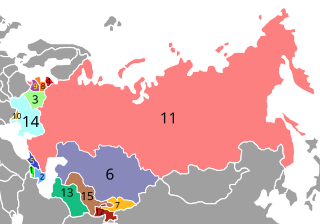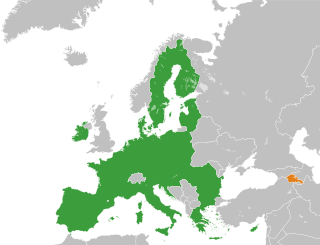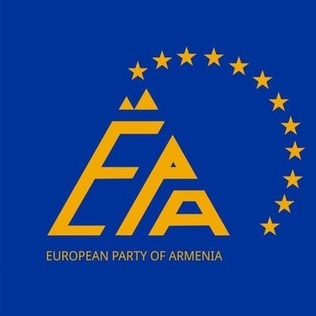| |||||
| Decades: | |||||
|---|---|---|---|---|---|
| See also: | Other events of 2015 List of years in Armenia | ||||
The following lists events that happened during 2015 in Armenia .
| |||||
| Decades: | |||||
|---|---|---|---|---|---|
| See also: | Other events of 2015 List of years in Armenia | ||||
The following lists events that happened during 2015 in Armenia .

The Union State of Russia and Belarus, officially also referred to as Union State, is a supranational union consisting of Belarus and Russia, with the stated aim of deepening the relationship between the two states through integration in economic and defence policy. Originally, the Union State aimed to create a confederation; however, both countries currently retain their independence.

Aleksandr Gelyevich Dugin is a Russian far-right political philosopher.

Gyumri is an urban municipal community and the second-largest city in Armenia, serving as the administrative center of Shirak Province in the northwestern part of the country. By the end of the 19th century, when the city was known as Alexandropol, it became the largest city of Russian-ruled Eastern Armenia with a population above that of Yerevan. The city became renowned as a cultural hub, while also carrying significance as a major center of Russian troops during Russo-Turkish wars of the 19th century.

The post-Soviet states, also referred to as the former Soviet Union (FSU) or the former Soviet republics, are the independent sovereign states that emerged/re-emerged from the dissolution of the Soviet Union in 1991. Prior to their independence, they existed as Union Republics, which were the top-level constituents of the Soviet Union. There are 15 post-Soviet states in total: Armenia, Azerbaijan, Belarus, Estonia, Georgia, Kazakhstan, Kyrgyzstan, Latvia, Lithuania, Moldova, Russia, Tajikistan, Turkmenistan, Ukraine, and Uzbekistan. Each of these countries succeeded their respective Union Republics: the Armenian SSR, the Azerbaijan SSR, the Byelorussian SSR, the Estonian SSR, the Georgian SSR, the Kazakh SSR, the Kirghiz SSR, the Latvian SSR, the Lithuanian SSR, the Moldavian SSR, the Russian SFSR, the Tajik SSR, the Turkmen SSR, the Ukrainian SSR, and the Uzbek SSR. In Russia, the term "near abroad" is sometimes used to refer to the post-Soviet states other than Russia.

The Armenian Communist Party is a communist party in Armenia. It considers itself the successor to the Armenian branch of the Communist Party of the Soviet Union. It is the main communist party in Armenia and claimed 18,000 members in 2006. HKK publishes Hayastani Komunist and Pravda Armenii.

The Collective Security Treaty Organization (CSTO) is an intergovernmental military alliance in Eurasia consisting of six post-Soviet states: Armenia, Belarus, Kazakhstan, Kyrgyzstan, Russia, and Tajikistan, formed in 2002. The Collective Security Treaty has its origins in the Soviet Armed Forces, which was replaced in 1992 by the United Armed Forces of the Commonwealth of Independent States, and was then itself replaced by the successor armed forces of the respective independent states.

The Nagorno-Karabakh conflict is an ethnic and territorial conflict between Armenia and Azerbaijan over the region of Nagorno-Karabakh, inhabited mostly by ethnic Armenians until 2023, and seven surrounding districts, inhabited mostly by Azerbaijanis until their expulsion during the 1990s. The Nagorno-Karabakh region was entirely claimed by and partially controlled by the breakaway Republic of Artsakh, but was recognized internationally as part of Azerbaijan. Azerbaijan gradually re-established control over Nagorno-Karabakh region and the seven surrounding districts.
Eurasianism is a socio-political movement in Russia that emerged in the early 20th century under the Russian Empire, which states that Russia does not belong in the "European" or "Asian" categories but instead to the geopolitical concept of Eurasia governed by the "Russian world", forming an ostensibly standalone Russian civilization.

The Russian 102nd Military Base is a Russian military base in Gyumri, Armenia, under the command of the Southern Military District of the Russian Armed Forces.

Armenia and the European Union have maintained positive relations over the years. Both parties are connected through the Comprehensive and Enhanced Partnership Agreement (CEPA), which was signed in 2017. Former Armenian Foreign Minister Eduard Nalbandyan expressed confidence that the new partnership agreement would "open a new page" in EU–Armenia relations. Meanwhile, the former High Representative of the Union for Foreign Affairs and Security Policy, Federica Mogherini concluded in June 2019, that Armenia–EU relations are on an "excellent" level. Should either Georgia or Turkey, who are candidates for EU membership, accede to the EU, Armenia will border the European Union.

Bilateral relations between modern-day Armenia and the Russian Federation were established on 3 April 1992, though Russia has been an important actor in Armenia since the early 19th century. The two countries' historic relationship has its roots in the Russo-Persian War of 1826 to 1828 between the Russian Empire and Qajar Persia after which Eastern Armenia was ceded to Russia. Moreover, Russia was viewed as a protector of the Christian subjects in the Ottoman Empire, including the Armenians.
The foreign policy of Vladimir Putin concerns the policies of the Russian Federation's president Vladimir Putin with respect to other nations. He has held the office of the President previously from 2000 to 2008, and reassumed power again in 2012 and has been President since.

The Eurasian Economic Union is an economic union of five post-Soviet states located in Eurasia. The EAEU has an integrated single market. As of 2023, it consists of 183 million people and a gross domestic product of over $2.4 trillion.

The Customs Union of the Eurasian Economic Union or EAEU Customs Union is a customs union of 5 post-Soviet states consisting of all the member states of the Eurasian Economic Union which initially became effective on January 1, 2010 at the date of implementation of the common external tariff (CET) as the Customs Union of the Eurasian Economic Community or Customs Union of Russia, Belarus and Kazakhstan. It was inherited from the Eurasian Economic Community and is now regulated by Part Two of the Treaty on the Eurasian Economic Union, EAEU Customs Code, other international agreements and by decisions of supranational bodies as Supreme Eurasian Economic Council, Intergovernmental Council and Eurasian Economic Commission.
On 18 March 2014, a Ukrainian soldier and a Russian Cossack paramilitary were killed in the first case of bloodshed during the Russo-Ukrainian War and the annexation of Crimea by the Russian Federation.
The future enlargement of the Eurasian Economic Union is theoretically open to any of the post-Soviet states and potentially any country of Europe or Asia. In order to accede, a state must fulfill certain economic and political requirements. Enlargement of the Eurasian Economic Union is also subject to the consent of all existing members and the candidate's adoption of existing EEU laws and implementing previous decisions made by the Eurasian Economic Commission. The present agenda of the enlargement of the Eurasian Economic Union is primarily focused on Tajikistan. Meanwhile, Moldova was granted Observer Status in April 2017, followed by Uzbekistan and Cuba in December 2020. The process of enlargement is referred to as Eurasian integration or Eurasianism. This term is also used to refer to the intensification of economic cooperation between Eurasian Economic Union member states.

The Eurasian Economic Union (EEU) currently comprises 5 member states, which are party to the founding treaties of the EEU and thereby subject to the privileges and obligations of membership. The constituent states of the EEU are placed under binding laws and have equal representation within the EEU's executive and judicial bodies. They do however retain considerable autonomy, and must be unanimous for the EEU to adopt policies or new member states. Consensus is a founding principle of the EEU.

The Gyumri massacre was a mass murder of seven members of the Armenian Avetisyan family in Gyumri, Armenia, on January 12, 2015. The suspect, Valery Permyakov, a Russian serviceman from the Russian 102nd Military Base, was apprehended by the Armenia-based Russian Border Guards near the border with Turkey and brought into custody at the Gyumri base for further investigation under the Russian jurisdiction. Spontaneous demonstrations in Gyumri and Yerevan ensued, demanding that Permyakov be tried and serve his sentence in Armenia. Perceived inadequate government response further triggered public outrage in Armenia in early 2015 following the incident. In August 2016, Permyakov was sentenced to life on charges of murder by an Armenian court; the court's ruling was upheld in December 2016 by the Appeals Court in Yerevan.

The European Party of Armenia (EPA) is a pro-European political party in Armenia. It was founded on 6 November 2018 by Tigran Khzmalyan. The party supports Armenia's accession process to the European Union and NATO.

The Kumayri historic district, also known as the Kumayri Historical and Cultural Museum-Reserve, is the oldest part of Gyumri with its own unique architecture. It has more than a thousand buildings dating back to the 19th and 20th centuries. The district is one of few places in Armenia, and the world, with authentic urban Armenian architecture. Almost all the structures of the Kumayri district have survived the two major earthquakes in 1926 and 1988 respectively. The historic district of Kumayri occupies the central and western part of modern-day Gyumri.